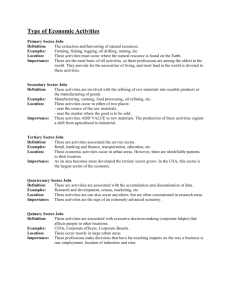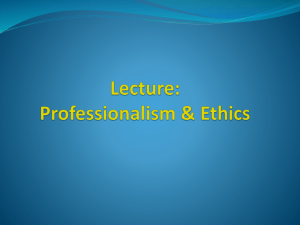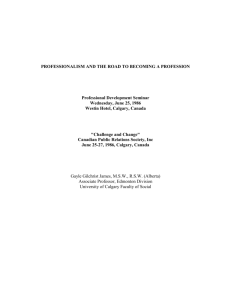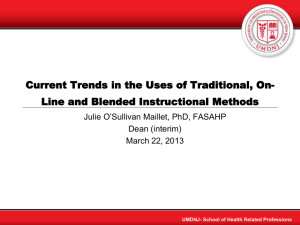Core Standards for Internet Mental Health Practice
advertisement
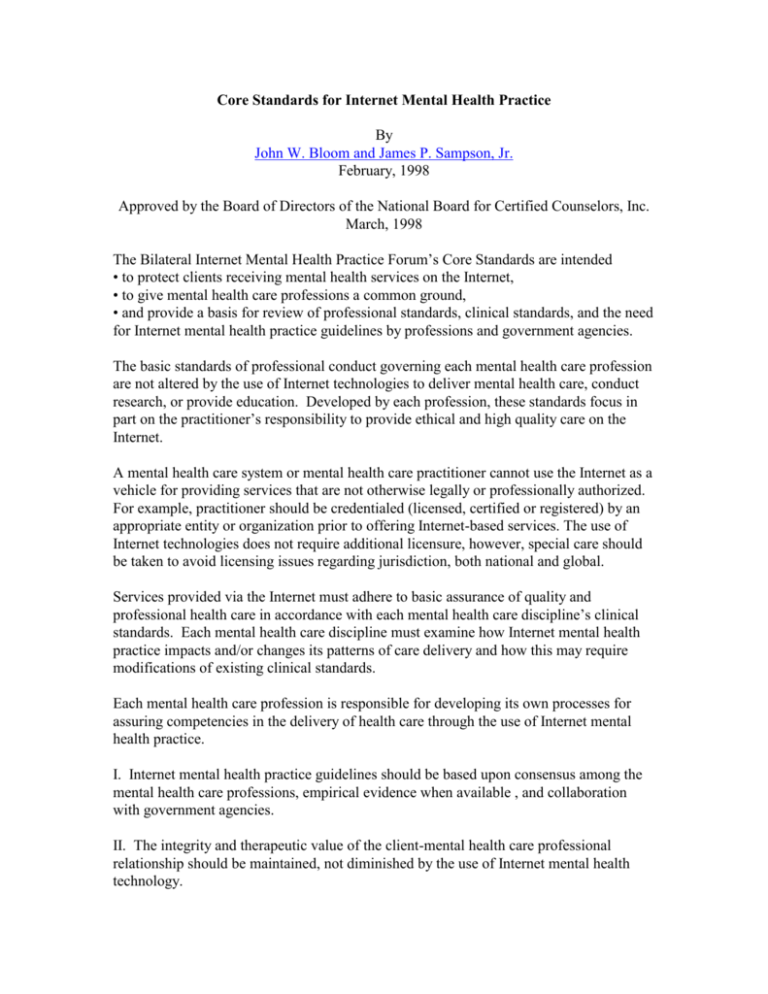
Core Standards for Internet Mental Health Practice By John W. Bloom and James P. Sampson, Jr. February, 1998 Approved by the Board of Directors of the National Board for Certified Counselors, Inc. March, 1998 The Bilateral Internet Mental Health Practice Forum’s Core Standards are intended • to protect clients receiving mental health services on the Internet, • to give mental health care professions a common ground, • and provide a basis for review of professional standards, clinical standards, and the need for Internet mental health practice guidelines by professions and government agencies. The basic standards of professional conduct governing each mental health care profession are not altered by the use of Internet technologies to deliver mental health care, conduct research, or provide education. Developed by each profession, these standards focus in part on the practitioner’s responsibility to provide ethical and high quality care on the Internet. A mental health care system or mental health care practitioner cannot use the Internet as a vehicle for providing services that are not otherwise legally or professionally authorized. For example, practitioner should be credentialed (licensed, certified or registered) by an appropriate entity or organization prior to offering Internet-based services. The use of Internet technologies does not require additional licensure, however, special care should be taken to avoid licensing issues regarding jurisdiction, both national and global. Services provided via the Internet must adhere to basic assurance of quality and professional health care in accordance with each mental health care discipline’s clinical standards. Each mental health care discipline must examine how Internet mental health practice impacts and/or changes its patterns of care delivery and how this may require modifications of existing clinical standards. Each mental health care profession is responsible for developing its own processes for assuring competencies in the delivery of health care through the use of Internet mental health practice. I. Internet mental health practice guidelines should be based upon consensus among the mental health care professions, empirical evidence when available , and collaboration with government agencies. II. The integrity and therapeutic value of the client-mental health care professional relationship should be maintained, not diminished by the use of Internet mental health technology. III. Confidentiality of client diagnosis, treatment, and consultation records, Internet mental health contacts, and mental health care information systems is essential. IV. Informed consent documents need to incorporate concerns unique to Internet mental health practice. V. The safety of clients and practitioners involved in Internet mental health practice must be ensured. Appropriate hardware and valid software, combined with demonstrated user competency and readiness, are essential components. VII. A systematic and comprehensive research agenda must be developed and supported by government agencies and the mental health care professions for the ongoing assessment of Internet mental health practices. VIII. Geographically remote mental health care professionals must be aware of locationspecific conditions, events, and cultural issues that may limit credibility or lead to inappropriate interventions. IX. The mental health professional has an obligation to be aware of free public access points to the Internet within the client’s community, such as public libraries, so that a lack of financial resources does not create a significant barrier to clients accessing resources and services. X. Geographically remote mental health care professionals shall provide potential clients with appropriate backup measures such as the name and phone number of a local on-call professional, a local crisis intervention number, or a reminder about calling 911 in emergency situations. John W. Bloom is Professor and Coordinator of the Counselor Education Program, Butler University, Indianapolis, IN. James P. Sampson, Jr. is Professor and Co-Director of the Center for the Study of Technology in Counseling and Career Development at Florida State University, Tallahassee, FL. Correspondence should be addressed to John W. Bloom, Ph.D., Butler University, 4600 Sunset Drive, Indianapolis, IN 46208. Jbloom@butler.edu (317) 940-9490 (voice) (317) 940-6481 (FAX).



